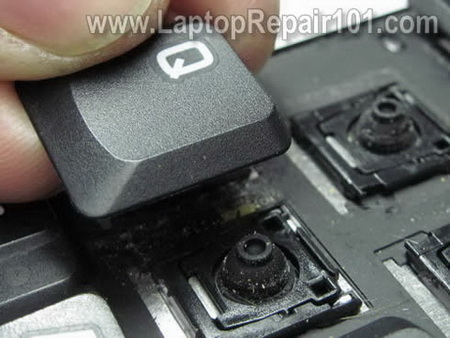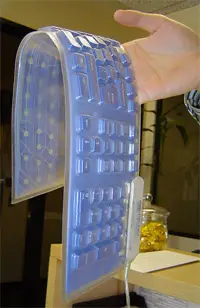 The problem that the project is addressing is that mechanical laptop keyboards have many disadvantages. First off, their design lacks integrity to last over the years. A traditional design of keyboards consists of keys made of thin plastic blocks and fasteners. These types of keyboards have the problem of letting dust, hair, and other small debris to lodge under the keys. This hinders a person to type smoothly and also, damages the keys as they are used more often. Another disadvantage is that the keyboards slightly damages the screen when a laptop is closed. Furthermore, mechanical laptop keyboards lack the ability to personalize with the user. To elaborate, it means a keyboard layout would be more comfortable to an individual with its personalized setting.
The problem that the project is addressing is that mechanical laptop keyboards have many disadvantages. First off, their design lacks integrity to last over the years. A traditional design of keyboards consists of keys made of thin plastic blocks and fasteners. These types of keyboards have the problem of letting dust, hair, and other small debris to lodge under the keys. This hinders a person to type smoothly and also, damages the keys as they are used more often. Another disadvantage is that the keyboards slightly damages the screen when a laptop is closed. Furthermore, mechanical laptop keyboards lack the ability to personalize with the user. To elaborate, it means a keyboard layout would be more comfortable to an individual with its personalized setting. Design Constraints
Some design constraints faced in designing the liquid crystal display (LCD) touch screen keyboard are time, money, size of the keyboard, and energy efficient. The group is to find a cheap and efficient of building the liquid crystals as well as the touch sensors. The group is given a ten week period to fully construct a LCD touch screen keyboard. The size of the keyboard has to compatible with most popular laptops. The size of the keyboard can not be too thick and too wide. The energy consumption of the keyboard should be at minimal for optimal laptop battery life and would not drain the battery life.
Pre-existing Solutions
There are many different types of keyboards available.
One type is a roll-up keyboard. It is made so that it can roll-up, making it convenient for travels. It also solves the problem of build up of dust and debris because the whole keyboard is like a layer of gel. [1]
Another type is a glass keyboard. Though the glass keyboard is not on the market, the available information shows that it is something to look out for in the future. The glass keyboard has a glass platform with motion sensors. This type of keyboard solves the problem of dust and spills because all that is required is wiping it down. [2]
Project Goals
The goal of this project is to create a more advantageous, personalized keyboard using liquid crystal display(LCD) and touch sensing technology. By having the keyboard displayed on an LCD, users will be able to customize the keyboard to whatever extent they need. In theory, the keyboard will be able to change the size of it's keys or even be able to add new keys or get rid of unused keys. Not only that, but because the keyboard will be one LCD screen, it will be easy to clean and the keys will not wear out. No dust or dirt will be able to get underneath the keys, meaning that, generally, it will last longer.
Project Deliverables
The deliverable will be a LCD with touch sensing capabilities. On the LCD will be a display resembling that of a number pad. The LCD will also have some method of relaying information to a computer.
Project Schedule
Week 3
Gather more research on the mechanics of LCD touchscreen keyboard
Find materials needed to build LCD touchscreen keyboard
Week 4
Order the needed materials to build LCD touchscreen keyboard
Start designing the general idea of a LCD touchscreen keyboard
Week 5
Finish design of LCD touchscreen keyboard
Week 6 & 7
Construct LCD touchscreen keyboard
Week 8
Test finished product of LCD touchscreen keyboard
Make changes to product after testing
Week 9
Analysis and make all changes and adjustment of LCD touchscreen keyboard
Final product LCD touchscreen completed
Project Budget
Liquid Crystal
- (S)-4-[(1-Methylheptyloxy)carbonyl]phenyl 4′-octyloxy-4-biphenylcarboxylat, product number # 408859-500MG - $140.50
- Grove - Touch Sensor, Item #: SEEED-SEN11303P - $4.95

